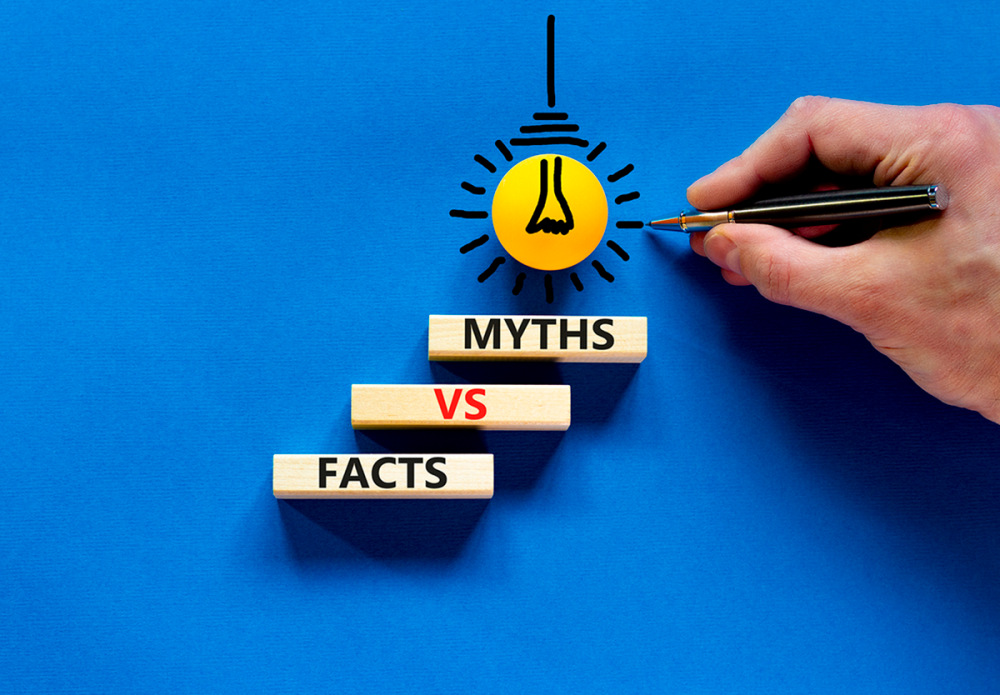Cancer touches many of us. In the United States, it is estimated that cancer will affect one in every three people. Thanks to the internet, there’s a lot of information out there—but there’s a lot of misinformation floating around too!
Here is some of the latest evidence-based data to help clear up some common myths and misconceptions:
1. Sugar and artificial sweeteners cause cancer
This myth likely comes from the fact that cancer cells consume glucose (sugar)—but this is true of all cells, not just cancer cells. There is no evidence that sugar consumption has any effect on cancer, whether good or bad.
Similarly, there has been no link found between artificial sweeteners and cancer. Most artificial sweeteners have been approved by the Food and Drug Administration (FDA) and are safe to consume.
However, a high-sugar diet can contribute to excess weight gain, which has been associated with an increased risk of developing certain kinds of cancer. If you have concerns about your sugar intake or other aspects of your diet, please speak with your physician.
2. Smartphones and wi-fi cause cancer
Don’t worry, you can keep your smartphone! This myth is based on the idea that 5G networks, Wi-Fi, Bluetooth, and other technology that work by transmitting radio waves can damage DNA. While gene mutations do cause cancer, the energy emitted by these devices is too low to cause mutations.
These are still relatively new technologies, so research will continue to develop over time, but there is no evidence that the use of cell phones, wireless headphones, or other similar devices is linked to cancer.
3. Power lines cause cancer
Researchers have not found compelling evidence linking cancer to residential magnetic fields.
The electric current that runs through a power line creates an extremely low frequency (ELF) electromagnetic field (EMF). It is a type of non-ionizing radiation that does not damage genes.
4. Cancer is contagious
Cancer isn’t contagious and doesn’t easily spread from person to person the way a cold can. There is an extremely low chance of transplant-related cancer being spread from a tissue or organ transplant if you receive an organ from someone who has cancer. However, doctors take precautions to avoid using organs or tissues from someone diagnosed with cancer.
In some cases, you may catch a virus that can lead to cancer, like the human papillomavirus (HPV), or encounter cancer-causing bacteria like Helicobacter pylori (H. pylori).
5. Superfoods can prevent cancer
Superfoods do not have superpowers. Foods like acai, blueberries, and green tea can have great health benefits as a part of a balanced, healthy diet. But there is no scientific basis for calling them superfoods, and there is no evidence to support the idea that they prevent cancer. But don’t write them off—adding fruits and vegetables to your diet can be beneficial to your overall health, even if they aren’t a miracle cure.
6. Stress causes cancer
There are no studies that conclusively point to stress itself as a cause of cancer. Chronic stress can have a negative effect on a person’s health, and this can be amplified if unhealthy behaviors are used as a coping mechanism.
Patients often experience increased levels of stress after being diagnosed with cancer. You may cycle through a range of emotions like anger, frustration, sadness, or anxiety. It’s important to know that this is normal! These emotions will not make your cancer worse or alter the course of your diagnosis or treatment. Finding healthy ways to cope with these emotions can be beneficial during your treatment journey.
For more information, see the NCI fact sheet on Stress and Cancer.
7. Underwire bras are a breast cancer risk
There are no studies to evidence that women who opt for underwire bras are more likely to develop breast cancer. The theory that underwire design may block lymphatic flow is not scientifically supported.
8. Surgeries and biopsies spread cancer
The chances of cancer spreading through a surgical procedure are extremely low. Surgeons take preventative measures, so cancer cells don’t spread during surgeries, such as using sterilized tools when performing procedures on different parts of the body.
There is also no conclusive evidence that a needle biopsy, which is often used to diagnose cancer cells, can cause cancer to spread. If there is a risk with a particular body part, the physician will not perform a needle biopsy to diagnose.
9. If someone in my family has cancer, I’ll get it too
In families with a specific mutation, multiple members may develop the same type of cancer. However, only five to ten percent of cancers are hereditary. A more significant percentage of cancers develop from mutations resulting from lifestyle choices, environmental factors, or aging.
For more information about cancer risk, see the NCI fact sheet on Genetic Testing for Inherited Cancer Susceptibility Syndromes and Cancer Causes and Risk Factors.
10. If no one in my family has cancer, I won’t get it either
Cancer can affect anybody at any time regardless of your family history. In the US, approximately 39.5% of men and women will be diagnosed with cancer during their lifetimes. By cultivating healthy habits, cancer risk can be reduced. And by following screening guidelines, cancer can be detected early, when it is easiest to treat.
It’s important to banish myths and keep up to date with cancer facts. There have been great advancements in cancer treatments, but improving outcomes starts with you. Speak to your doctor about screening guidelines and steps you can take to reduce your risk for cancer.




